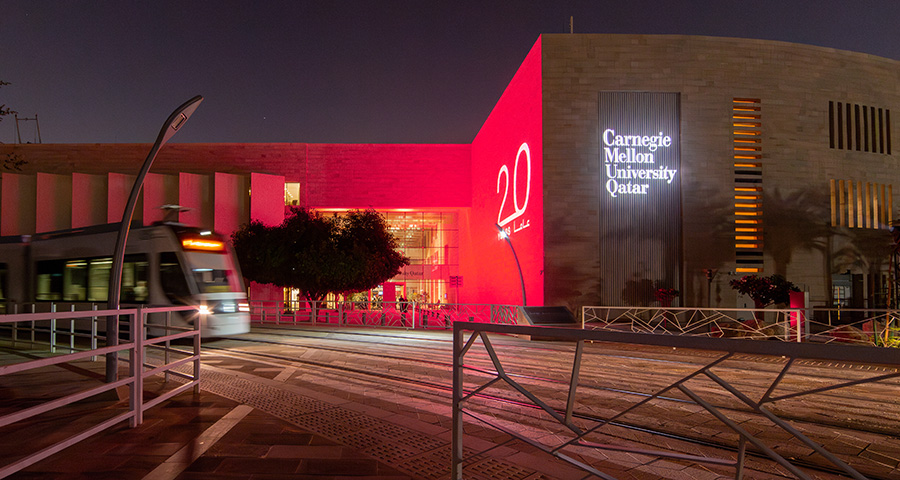
The transformative power of education in Qatar: 20 years of Carnegie Mellon
By Michael Trick, dean of Carnegie Mellon University in Qatar
As Carnegie Mellon University in Qatar (CMU-Q) celebrates its 20th anniversary, I have been reflecting on the journey of this campus, the impact we have had over the past two decades, and the direction we are heading in our third decade in Qatar Foundation’s Education City.
A partnership is born
In 2001, Her Highness Sheikha Moza bint Nasser approached Dr. Raj Reddy, a renowned roboticist at Carnegie Mellon’s School of Computer Science. She asked if Carnegie Mellon would be interested in bringing its world-class computer science education to Qatar.
Sheikha Moza’s vision was to transform Qatar through the power of education. By bringing established, exceptional programs to Qatar, Education City would offer opportunities to learn and innovate that were otherwise not available to many people in Qatar and the region. Dr. Reddy brought her proposal to the leadership at CMU.
In 2001, President Jared L. Cohon and Provost Mark Kamlet also believed that education has a transformative effect on people and societies. By reaching beyond the traditional borders of the university, CMU could share its unique approach to education on a global scale. Over the next few years, a plan was created to open a small campus that offered undergraduate programs in business administration and computer science.
This was the beginning of a partnership based on the shared vision of education driving progress, equality, and innovation. And as the campuses of Education City have become established and thousands of students graduate from partner universities each year, the impact of this shared vision is palpable.
The impact of 20 years
Carnegie Mellon University in Qatar opened its doors in 2004 with just 41 students in the programs of business administration and computer science. To address the changing needs of Qatar, CMU-Q added the information systems program in 2007, and biological sciences in 2011. We are now situated in a beautiful building in the heart of the Education City campus, and more than 450 students are pursuing their degrees here.
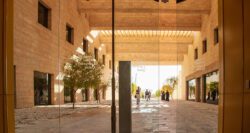
Students arrive for class at CMU-Q.
To see the true impact of CMU-Q, however, we must look to the graduates. More than 1,300 students have completed their studies at CMU-Q and are now pursuing their careers in Qatar and around the world. They are leaders in business, technology, healthcare, government, and the arts, shaping industries and inspiring positive change. Some of our graduates have become university educators themselves, and are now shaping a new generation with their teaching and research.
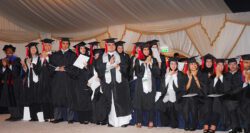
The Class of 2008 was the first to graduate from CMU-Q.
As we follow the careers of our alumni, we have noticed that most stay and make their lives and careers in Qatar. Many more complete graduate studies overseas, and return here to give back to the country that launched their career journeys.
For Qatari graduates, CMU-Q has provided the educational foundation to contribute to their country in meaningful ways. For alumni who are citizens of other countries, there is a sense of deep gratitude and appreciation to Qatar Foundation and Her Highness Sheikha Moza. Quite simply, Education City has provided opportunities to students who otherwise would not have had access to such a resource. For two decades, CMU-Q has been an integral part of realizing this vision.
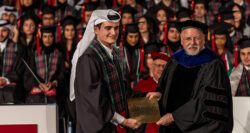
The Class of 2024 was the largest in campus history.
Looking to the future
During my years at CMU-Q, I have seen Education City mature and adapt. The Next GenEd initiative has been especially close to my heart. With my colleagues at the partner universities, we are encouraging students to explore the breadth of knowledge at Education City through elective courses in the arts and sciences. As opportunities for cross-registration, collaborative certificates and minors, and co-curricular programs continue to grow, so do the enrichment opportunities for our students.
As we begin our third decade in Qatar, CMU-Q is in a unique position to contribute to Qatar and the world. Artificial intelligence was created at Carnegie Mellon more than a half century ago, and advancing the field of AI remains one of our key priorities. As a campus that offers programs in computer science and information systems, we have always had talented faculty members who are experts in AI. As it becomes more integrated with daily life, AI is likewise a growing part of our curriculum, and a popular area of research for faculty and students. I expect this is only the beginning.
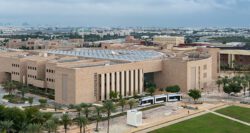
CMU-Q is proud to be in the heart of Education City.
We are also a small campus with the exceptional resources of the global CMU community. Evidence-based research in teaching and learning takes place across the disciplines at the Pittsburgh campus. We work closely with these researchers to develop new tools, create better teaching techniques, and improve the learning experience for students. AI is a vital part of this research, and I am exceptionally proud of the creativity, thoughtfulness, and innovation our faculty show as they strive to make the educational experience even better.
As we at CMU-Q celebrate our 20th anniversary, I am profoundly thankful to the people who had the original vision for this campus, and to those who contributed their talent and hard work to make CMU-Q the fine university it is today. I also continue to be amazed by the creativity, success, and contributions of our graduates. They embody the vision that education can be transformative, and I look forward to seeing how they continue to grow and thrive.
